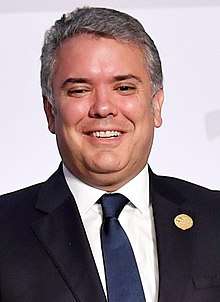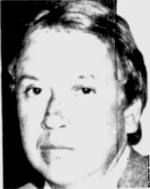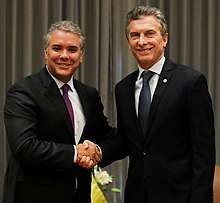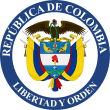Iván Duque Márquez
Iván Duque Márquez (born August 1, 1976) is a Colombian politician and lawyer who is the current President of Colombia, in office since 7 August 2018. He was elected Colombia's youngest president, as the candidate from the Democratic Centre Party in the 2018 presidential election. Backed by his mentor, former President Alvaro Uribe, he ran a campaign where he stood against the peace treaty with the guerilla group FARC.[1]
His Excellency Iván Duque Márquez | |
|---|---|
 | |
| 33rd President of Colombia | |
| Assumed office 7 August 2018 | |
| Vice President | Marta Lucía Ramírez |
| Preceded by | Juan Manuel Santos Calderón |
| Senator of Colombia | |
| In office July 20, 2014 – April 10, 2018 | |
| Personal details | |
| Born | 1 August 1976 Bogotá, Colombia |
| Political party | Democratic Center |
| Spouse(s) | María Juliana Ruiz Sandoval |
| Alma mater | Sergio Arboleda University American University Georgetown University |
| Signature |  |
His tenure has been criticized for the increasing incidence of the murder of ex-guerrilla fighters that surrendered under a previous peace agreement, the increasing murder of union leaders and environmentalists, stopping peace negotiations with ELN and resuming war operations, the use of the military to squash anti-government processes (particularly during the 2019 protests), and the expulsion of United Nations Human Rights Observers [2][3]
Life and career

Duque was born in Bogota, in a wealthy political family that originally came from the Colombian town of Gomez Plata, Antioquia. He was the son of Juliana Márquez Tono (political scientist) (1950–) and Iván Duque Escobar (1937–2016), a powerful local political leader who was Governor of Antioquia, auditor in the United Nations, Minister of Mines and Energy, and who was the head of the National Registry of Civil Status in the Government of Andrés Pastrana.[4] Duque’s siblings are Andrés and María Paula.[5]
Duque attended Colegio Rochester and graduated from Sergio Arboleda University in Bogotá in 2000 with a degree in law.[6] He holds a LLM in International Economic Law from American University and a Masters in Public Policy Management from Georgetown University, Washington D.C.. Duque also attended an Executive Education course at Harvard University for 5 days, where he studied business and government.[7]
He began his professional career in 1999 as a consultant in the Andean Development Corporation (CAF) and later served as an advisor at the Colombian Ministry of Finance and Public Credit during the government of Andrés Pastrana (1998–2002).
Subsequently, he was appointed by Juan Manuel Santos, future president and then Minister of Finance, as one of Colombia's representatives at the Inter-American Development Bank (IDB), a post he held between 2001 and 2013. There he served as chief of the Division of Culture, Solidarity, and Creativity.
Duque also served as international advisor of former President Álvaro Uribe Vélez. Between 2010 and 2011, he was a consultant at the United Nations (UN) in the Research Panel appointed by the Secretary-General for the Incident of the Gaza Flotilla that occurred on May 31, 2010, between Israel and Turkey, known as Mavi Marmara.
Political background
Duque returned to Colombia to become a candidate for the Senate in the legislative elections of 2014, for the Partido Centro Democrático (Democratic Center Party) which split away from the ruling governing party after Juan Manuel Santos opened peace negotiations with the FARC. This new party campaigned against the new peace agreement and the Santos Government, and was led by right wing former president Uribe.
Uribe created his own political party and presented himself and a list of hand picked political allies as candidates for the office of Congressman in a closed list, which meant that people could not vote for an individual congressman but had to vote for the party as a whole in both the upper and lower chamber elections. Duque was included in the number seven spot of the closed off list for the Senate and thus was elected senator.
During his time as a senator, he was the author of four laws:
- Law 1822 of January 4, 2017,[8] increasing the maternity leave from 14 to 18 weeks, so mothers could spend more time with their newborn children, a benefit that was also extended to adoptive mothers.
- Law 1831 of May 2, 2017,[9] for the availability of defibrillators in public facilities and places of high public influx, in order to save lives, since heart attacks are the leading cause of death in Colombia.
- Law 1809 of September 29, 2016,[10] for the use of advanced severance payments for educational insurance, so that more families can send their children to the university.
- Law 1834 of May 23, 2017,[11] the "Orange Law" for the promotion, development and protection of the creative and cultural industries.
President of Colombia

_(cropped).jpg)
Election
On 10 December 2017, Duque was appointed by his party as its candidate for President of Colombia. He won the nomination through a system of surveys conducted by the party, with a 29.47% favorability compared to the other two candidates: Carlos Holmes Trujillo who obtained 20.15%, and Rafael Nieto with 20.06%. In January 2018, it was announced that the center-right coalition would participate in the Grand Primary for Colombia – an interparty consultation - with Duque as its candidate confronting Marta Lucía Ramírez (civil-center right movement) and Alejandro Ordóñez (right wing civil movement).[12] On 11 March 2018, Duque won the primary with more than 4 million votes. Ramírez was second, with just over 1.5 million votes, and Ordóñez came third with 385,000 votes. During his speech, Duque thanked the support of Colombians at the polls and announced Marta Lucía Ramírez as his running mate in the elections.
On 27 May 2018 Duque earned the most votes in the first round of the presidential election with over 39% of the vote.[13] Duque was elected President of Colombia on 17 June 2018 after defeating Gustavo Petro 54% to 42% in the second round. He was sworn in on 7 August 2018 at the Bogota's Bolivar Square.[14]
Immigration
The Presidency of Ivan Duque has continued the policies of his predecessor Juan Manuel Santos in regards to immigration, and the Venezuelan refugee crisis. Ivan Duque's government has been a vocal supporter for the Venezuelan Refugees at the United Nations and has provided aid, schooling and health care for many, and has been a vocal critic of other South American countries closing of doors to Venezuelan Refugees.[15] In 2018 Duque has dedicated .5% of Government Spending to supporting refugees accounting for about 20% of Colombia's budget short fall, despite opposition.[16] In response to this criticism on a televised address Duque stated: “For those who want to make from xenophobia a political path, we adopt the path of brotherhood, for those who want to outcast or discriminate against migrants, we stand up today … to say that we are going to take them in and we are going to support them during difficult times.” Duque's policies regarding have received repeated praise from international humanitarian organizations for its efforts to legalize, formalize and offer assistance to refugees, and the Atlantic has noted that it has set the bar welcoming refugees. A representative from the International Rescue Committee has noted that: "[she's] never seen a government trying this hard to register people and leave the borders open, unfortunately," she added "the scale of this crisis, and the speed at which it changes, is more than Colombia can handle."[17]
Protests
The 2019 Colombian protests are a collection of protests that have occurred since 21 November 2019.[18] Hundreds of thousands of Colombians demonstrated to support the Colombian peace process and against the Duque government.[18][19][20]
Published books
Iván Duque is the author of the books Monetary Sins (2007), Machiavelli in Colombia (2010),[21] Orange Effect (2015),[22] IndignAcción (IndignAction) (2017)[23] and is co-author of the book The Orange Economy: An Infinite Opportunity (2013).[24] On March 12, 2018, he released The Future is at the Political Center (El futuro está en el centro), a compilation of the answers to questions that have arisen from Colombians during the campaign.
Duque has also been an Op-Ed contributor to several newspapers: El Colombiano, from Medellín; Portafolio and El Tiempo from Casa Editorial El Tiempo in Bogotá; and El País in Spain.
Personal life
Duque is Roman Catholic. He is married to María Juliana Ruiz Sandoval, with whom he has three children: Luciana, Matías and Eloísa.[25]
References
- Times, New York (17 June 2018). "Colombia Elects Iván Duque, a Young Populist, as President". The New York Times. Retrieved 28 December 2018.
- "Los detalles desconocidos de la guerra fría del Gobierno Duque con la ONU".
- "Colombia: Las autoridades deben investigar imparcialmente la represión de las protestas".
- "Ivan Duque Escobar". Semana. 26 May 2002. Retrieved 28 August 2018.
- Tiempo, Casa Editorial El (11 December 2017). "Este es Iván Duque, el candidato uribista a la presidencia 2018". Retrieved 3 December 2018.
- "Por primera vez, la Sergio Arboleda tiene presidente" (in Spanish). Semana. June 17, 2018. Retrieved 2018-07-11.
- "H.E. Iván Duque Márquez". Concordia. Retrieved 2018-12-09.
- "Ley 1822 de 2017" (PDF). Retrieved 3 December 2018.
- "Ley 1831 de 2017" (PDF). Retrieved 3 December 2018.
- "Ley 1809 de 2016" (PDF). Retrieved 3 December 2018.
- "Ley 1834 de 2017" (PDF). Retrieved 3 December 2018.
- "Iván Duque, el gran ganador de la jornada". Semana. Retrieved June 25, 2018.
- Murphy, Helen. "Colombia president-elect vows to unite nation, alter peace deal". Reuters. Retrieved June 25, 2018.
- "Iván Duque: Colombia's new president sworn into office". BBC News World Latin America. 2018-08-08.
- "A rude reception awaits many Venezuelans fleeing their country". The Economist. Retrieved 17 November 2019.
- "Millions of refugees from Venezuela are straining neighbours' hospitality". The Economist. Retrieved 17 November 2019.
- Baddour, Dylan (2019-01-30). "Colombia's Radical Plan to Welcome Millions of Venezuelan Migrants". The Atlantic. The Atlantic. Retrieved 17 November 2019.
- Daniels, Joe Parkin (2019-11-21). "Clashes in Colombia as hundreds of thousands protest against government". The Guardian. ISSN 0261-3077. Retrieved 2019-11-22.
- "Colombia protests prompt teargas, curfew and border closures". CNN. 22 November 2019. Retrieved 2019-11-22.
- "With nationwide strike, Colombia joins South America's season of protest". The Washington Post. 21 November 2019. Retrieved 22 November 2019.
- Tiempo, Casa Editorial El. "Maquiavelo en Colombia". Retrieved 3 December 2018.
- PlanetadeLibros, ©. "Efecto naranja – Iván Duque – Planeta de Libros". Retrieved 3 December 2018.CS1 maint: numeric names: authors list (link)
- Nacional, Librería. "Librería nacional – compra tus libros en linea desde cualquier lugar". Librería nacional. Retrieved 3 December 2018.
- "El BID lanza el libro sobre economía creativa y cultural "La Economía Naranja: una oportunidad infinita" – IADB". www.iadb.org. Retrieved 3 December 2018.
- "La Vida Desconocida, Familia y Pareja de Iván Duque". Protagonista.
External links
| Wikimedia Commons has media related to Iván Duque. |
- Official website
- Biography by CIDOB (in Spanish)
| Political offices | ||
|---|---|---|
| Preceded by Juan Manuel Santos |
President of Colombia 2018–present |
Incumbent |
